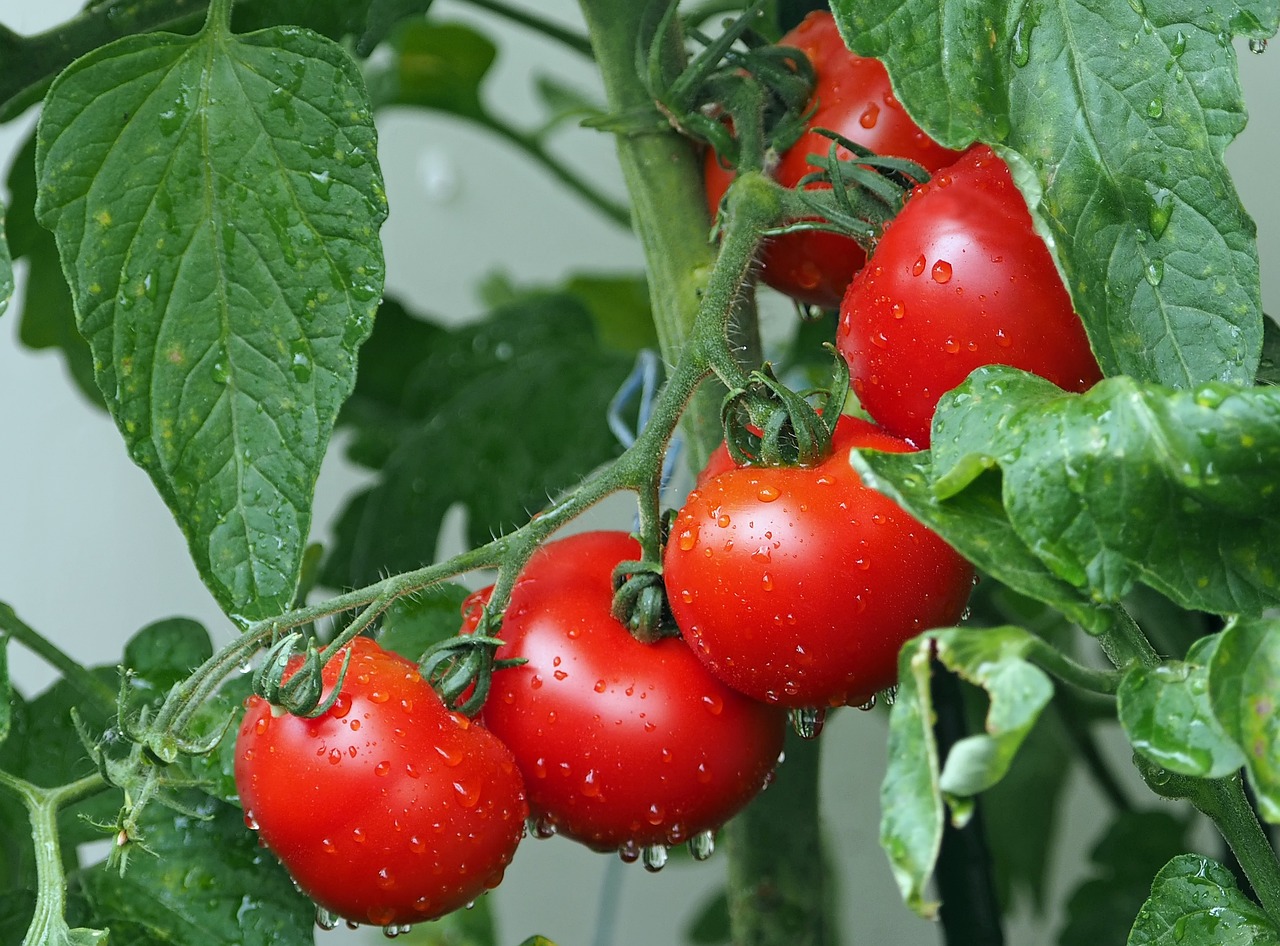Tomatoes are one of the most popular fruits in the world, and for good reasons. It is delicious, versatile, and nutritious. Can be eaten raw, cooked, or processed into sauces, soups, juices, and ketchup. They can also add color, flavor, and texture to salads, sandwiches, pizzas, pastas, and many other dishes.
But what exactly are tomatoes? Are they a fruit or a vegetable? And what are their health benefits and risks? In this blog post, will provide some tips and tricks to enjoy tomatoes in a healthy and tasty way.
What Are Tomatoes?
Tomatoes are technically a fruit because botanical definition of one: they are the fleshy parts of a plant that surround its seeds. However, for nutritional and culinary purposes, tomatoes are considered a vegetable due to their taste, use in meals, and nutrient content.
Tomatoes belong to the nightshade family of plants, which includes potatoes, eggplants, peppers, and tobacco. Some people may have an intolerance or allergy to nightshade plants and may experience symptoms such as digestive issues, joint pain, inflammation, or headaches after eating them. If you suspect you have a nightshade sensitivity, you may want to avoid or limit your intake of tomatoes and other nightshade foods.
Tomatoes originated in South and Central America and were domesticated by the ancient civilizations of the region. They were introduced to Europe by Spanish explorers in the 16th century and gradually spread to other parts of the world. Today, there are thousands of varieties of tomatoes with different shapes, sizes, colors, and flavors.
What Are the Health Benefits of Tomatoes?
Tomatoes are low in calories and high in water content. They provide important nutrients such as vitamin C, potassium, folate, and vitamin K. They are also rich in antioxidants, especially lycopene, which gives tomatoes their characteristic red color.
Lycopene is a powerful antioxidant that can protect your cells from damage caused by free radicals. Free radicals are unstable molecules that can cause oxidative stress and inflammation in your body. Oxidative stress and inflammation are linked to many chronic diseases such as cancer, heart disease, diabetes, Alzheimer’s disease, and Parkinson’s disease.
Studies have shown that lycopene may have various health benefits such as:
- Reducing the risk of prostate cancer1234567
- Lowering blood pressure
- Improving blood vessel function
- Protecting against sunburn
- Enhancing skin health
However, not all studies have found consistent or conclusive results on the effects of lycopene on health outcomes. More research is needed to confirm the optimal dose, form, and duration of lycopene supplementation for different populations and conditions.
Other antioxidants found in tomatoes include beta-carotene (which your body can convert into vitamin A), naringenin (which may have anti-inflammatory and anti-diabetic properties), chlorogenic acid (which may lower blood sugar levels), and quercetin (which may protect against allergies and infections).
How to enjoy tomatoes for Everyday breakfast, lunch and dinner
What Are the Health Risks of Tomatoes?
While tomatoes have many health benefits, they also have some potential drawbacks that you should be aware of. Some of the issues tomatoes can cause include:
- Acid reflux: Tomatoes are naturally high in acid, which can cause heartburn for those with gastroesophageal reflux disease (GERD) or a sensitive stomach. If you suffer from acid reflux, you may want to avoid or limit your intake of tomatoes and tomato products.
- Kidney stones: Tomatoes contain oxalates, which are compounds that can bind with calcium in your urine and form kidney stones. If you have a history of kidney stones or a high risk of developing them, you may want to avoid or limit your intake of tomatoes and other high-oxalate foods.
- Lead poisoning: Tomatoes can absorb lead from the soil or from contaminated containers or utensils. Lead is a toxic metal that can cause serious health problems such as anemia, neurological damage, and kidney failure. To prevent lead exposure from tomatoes, you should wash them thoroughly before eating them, choose organic tomatoes whenever possible, and avoid using lead-glazed pottery or pewter plates to store or serve them.
- Allergic reactions: Some people may be allergic to tomatoes or other nightshade plants and may experience symptoms such as itching, swelling, hives, rash, nausea, vomiting, diarrhea, or anaphylaxis after eating them. If you have a tomato allergy, you should avoid eating tomatoes and any products that contain them.
How to Enjoy Tomatoes
Tomatoes are a delicious and versatile fruit. You can enjoy them in many ways. Here are some tips:
- Pick ripe and fresh tomatoes: They have a deep red color, a firm texture, and a sweet and juicy flavor. They also have more lycopene and other antioxidants than unripe or overripe tomatoes. Fresh tomatoes are better than canned or processed tomatoes, as they have less sodium, sugar, and additives. Store them at room temperature for up to a week or in the fridge for up to two weeks.
- Cook them with healthy fats: This can make more lycopene and other antioxidants available, as heat releases the compounds from the cell walls. But lycopene needs fat to be absorbed by your body. So cook tomatoes with healthy fats like olive oil, avocado oil, or nuts and seeds. You can also add herbs and spices like garlic, basil, oregano, or turmeric to improve the flavor and the health benefits of tomatoes.
- Eat them with other foods: Tomatoes go well with many other foods and dishes, such as salads, sandwiches, pizzas, pastas, soups, stews, curries, salsas, dips, and sauces. You can also eat them with other fruits and vegetables that have vitamin C, such as citrus fruits, berries, peppers, broccoli, or kale. Vitamin C can help your body absorb more lycopene and other antioxidants from tomatoes.
- Eat them in moderation: Tomatoes have many health benefits, but they also have some risks. You should eat them in moderation and according to your needs and preferences. If you have any medical conditions or allergies that tomatoes may affect, you should talk to your doctor before eating them.
Conclusion
Tomatoes are a juicy fruit with many benefits and some risks. Low in calories and high in water content. They provide important nutrients such as vitamin C, potassium, folate, and vitamin K. They are also rich in antioxidants, especially lycopene, which may protect against various chronic diseases such as cancer, heart disease, diabetes, Alzheimer’s disease, and Parkinson’s disease.
However, tomatoes also have some potential drawbacks that you should be aware of. It can cause acid reflux for those with GERD or a sensitive stomach. Can increase the risk of kidney stones for those with a history or a high risk of developing them. They can absorb lead from the soil or from contaminated containers or utensils. They can trigger allergic reactions for those who are allergic to them.
Therefore, enjoying tomatoes in a healthy and tasty way by choosing ripe and fresh tomatoes, cooking with healthy fats, eating with other foods and in moderation.
I hope this blog post has helped you learn more about tomatoes and how to enjoy them in a healthy and tasty way. If you have any questions or comments, please feel free to leave them below.
Thank you for reading!




